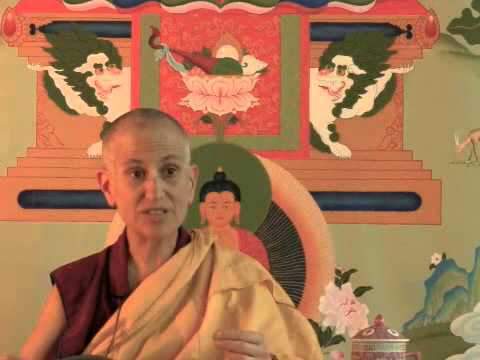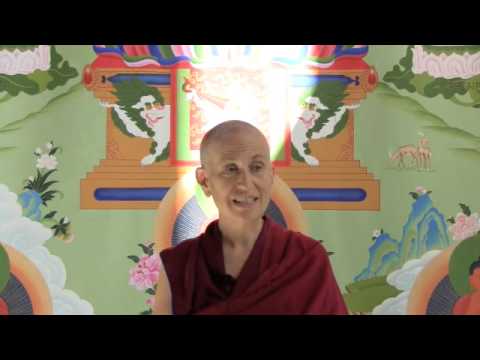The 10 non-virtues: Idle talk
The 10 non-virtues: Idle talk
Part of a series of Bodhisattva’s Breakfast Corner talks on the Stages of the Path (or lamrim) as described in the Guru Puja text by Panchen Lama I Lobsang Chokyi Gyaltsen.
- Multitasking
- Speaking about worthwhile topics
- Connecting with people, but aware of the motivation
- Being aware of the length of time we sit and talk
We talked about harsh words yesterday. And now our favorite one: idle talk.
So, we do that one a lot. Even here at the monastery. We can talk all day long. “Blah blah blah….” Hopefully what we try and do is really—because we’re in this environment—watch our speech a little bit more. Watch the topics we talk about. Watch the amount of talk we do.
I don’t know about the rest of you, but I have a hard time talking and doing something else. I don’t multitask very well. I know many people– You can tell when you’re on the phone, they’re talking to you on the phone and they’re also doing a few other things. And they talk very well, but you wonder—at least I always wonder—how much they’re really understanding of the conversation. Because that I can do, and just kind of pass it off and it sounds like I’m interested, but I’m not really there present with the person. And in my mind, if I’m not really present there with the person, then it kind of becomes idle talk, because I’m just “blah blah blah.”
I find it always better if you sit down to have a conversation then it’s got to be something interesting or you’re not going to want to keep sitting there. And if it’s something interesting then hopefully it’s something worthwhile. Although, I know for a lot of people talking about where you can get the latest new car, and so on and so forth, is extremely interesting. I find it rather boring. But we should try and have conversations where there’s really a sharing with other people.
That doesn’t mean all of our conversations have to be heart to heart meaningful discussions. But at least in our minds to try and relate it to the Dharma in one way or another. And to be careful about the topics we talk about. Because whatever we talk about usually comes to us in our meditation later on.
That’s why we keep silence during retreats, because when you talk then you sit down and meditate, you remember the conversation, and it’s: “Oh, I forgot to tell them that.” Or, “I should have said this….” Or, “They said that, I wonder what they really meant by that….” And then the mind starts spinning off in meditation to a conversation of idle talk that we just had.
There are certain times, certain circumstances, certain people where the way you connect is just by chit-chatting with somebody, so if you do that just to be aware that that’s what I’m doing. And have a specific reason you’re doing it. And do it for only a certain amount of time, don’t spend hours, or even an hour, doing it because the whole life can go by and…. I don’t know about you, but often these kinds of conversations, I don’t even remember what we talked about the next day. Do you? I don’t know. I often forget. It’s just kind of like information overload.
And then also, the amount of time we can spend talking about food…. This just amazes me. When you go to visit family and then you sit for hours talking about what restaurant you’re going to go to, or what food you’re going to cook, what you like… Hours and hours. And then of course when you sit down to eat the food that you’ve talked about for hours, you’re still talking with each other and you’re not really tasting the food that you got done talking about.
It’s true, isn’t it? I timed it once with the family. You know, 45 minutes it took them to decide what kind of take-out they’re going to get. And this was how everybody connected with each other, what they talked about.
So just to, kind of, not use so much time chatting about things that aren’t worthwhile. And always not to feel that we’re subjected to those kinds of conversations. Sometimes we feel, “Oh, I’m just with somebody, you’ve got to do this….” But then, you know, there’s a way to steer the conversation to something that may be something more tofu-ey, and not so frivolous.
And then to also monitor how long we talk. Because we’ve all been on the phone with somebody who just can’t be quiet. But we never feel like that’s us. But maybe other people do, and they just wish we would be quiet after a while because we’re going “blah blah blah,” on and on, and repeating ourselves, telling the same old stories about this and that that we told the last time…. So just to be aware of that.
Now that doesn’t mean to just shut up completely. But just to be careful and aware of who we’re talking to about what topic and for what purpose.
Because if we talk and talk and talk, I don’t know about you, but I get exhausted. I get totally exhausted. And so that’s why I think it’s good just to monitor ourselves. When people come, talk for a little while, then excuse ourselves and go take a walk, be quiet a little while, and then take care of the visitors a little bit more. But also help our visitors learn to find the peace that comes through not having to constantly going blah blah, 24/7.
Of course we all think it’s them that’s talking so much. Not us. Even though there are two people involved in the conversation, right? [Laughter]
Venerable Thubten Chodron
Venerable Chodron emphasizes the practical application of Buddha’s teachings in our daily lives and is especially skilled at explaining them in ways easily understood and practiced by Westerners. She is well known for her warm, humorous, and lucid teachings. She was ordained as a Buddhist nun in 1977 by Kyabje Ling Rinpoche in Dharamsala, India, and in 1986 she received bhikshuni (full) ordination in Taiwan. Read her full bio.


